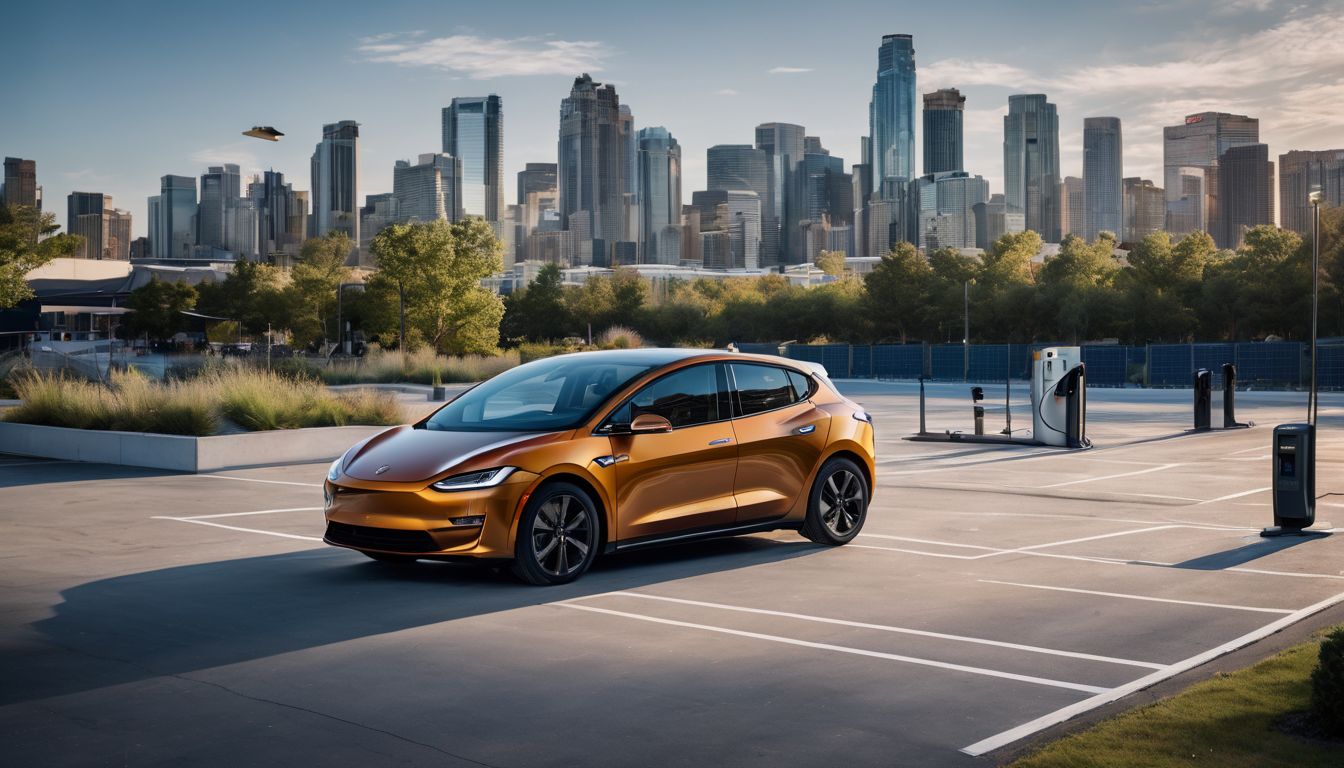We all know the feeling, that little wince as the numbers climb at the petrol station. It’s not just our wallets that feel lighter after; there’s also that niggling worry about the mark we’re leaving on this beautiful planet of ours.
But did you hear? There’s quite a stir being caused by electric autonomous cars – and for good reason, too. They boast absolutely no tailpipe emissions! We’ve delved into this innovative world to bring you insights that promise to be kinder to both your purse strings and our shared home.
So why not join us on this enlightening journey as we navigate through the revolution of cleaner, more efficient travel?.
Key Takeaways
- Electric autonomous cars combine electric power with self – driving technology, offering a cleaner and more efficient alternative to traditional petrol or diesel vehicles.
- These innovative cars feature different levels of automation, ranging from basic driver assistance to full self-driving capabilities without human input.
- Autonomous electric vehicles promise increased road safety by reducing the risk of accidents caused by human error and contribute to environmental sustainability through zero tailpipe emissions.
- The rise of autonomous electric cars is leading to significant changes in transport, legal frameworks, and the automotive industry as a whole.
- Ongoing research addresses challenges like safety standards and infrastructure needs while market transformation offers potential economic benefits and encourages eco-friendly business strategies.
What Are Electric Autonomous Cars?
Electric autonomous cars are vehicles that can operate without human intervention and are powered by electric motors. These cars use advanced technology to navigate, sense their environment, and make decisions while driving.
They range from partially automated to fully self-driving vehicles.
Definition of electric autonomous cars
Electric autonomous cars are vehicles that combine cutting-edge electric car technology with advanced vehicle automation. These smart transportation champions harness electricity to power their engines, making them a cleaner alternative to traditional petrol or diesel cars.
But what sets them apart is their ability to drive themselves. They use sensors, cameras, and artificial intelligence to navigate roads without human intervention.
Autonomous driving comes in different levels, from partially automated features that assist the driver to fully driverless cars. We find ourselves on the brink of an automotive revolution as these intelligent vehicles evolve rapidly.
Supporting this shift towards both electric and autonomous vehicles not only promotes environmental sustainability but also signals our commitment to innovative solutions for the future of transportation.
Different levels of vehicle automation
Electric autonomous vehicles operate on various levels of automation, offering different degrees of control to the vehicle. These levels range from no automation at all to full self-driving capabilities. The different levels of vehicle automation are as follows:
- Level 0: No Automation – The vehicle relies entirely on the driver for all tasks, with no automated assistance.
- Level 1: Driver Assistance – Basic functions such as steering or acceleration are automated, but the driver remains in control.
- Level 2: Partial Automation – The vehicle can control both steering and acceleration/deceleration under certain conditions, but the driver must remain engaged and monitor the environment at all times.
- Level 3: Conditional Automation – In specific driving scenarios, the vehicle can manage most aspects of driving, but still requires human intervention when prompted by the system.
- Level 4: High Automation – The vehicle can operate without any human input in specific conditions or environments, but may still have limitations.
- Level 5: Full Automation – The vehicle is capable of performing all driving tasks under all conditions without any human interference.
Advantages of Electric Autonomous Cars
Electric autonomous cars offer increased safety on the roads, as they are equipped with advanced technology that can react to potential dangers faster than human drivers. They also contribute to environmental sustainability by reducing carbon emissions and promoting cleaner air in urban areas.
Increased safety
Autonomous electric cars offer enhanced safety features through advanced technology and real-time monitoring systems. These vehicles reduce the risk of human error, as they can detect potential hazards and respond swiftly to prevent accidents.
With their ability to communicate with other vehicles and infrastructure, autonomous electric cars enhance road safety by minimising traffic congestion and reducing the likelihood of collisions.
Furthermore, these eco-friendly cars are equipped with state-of-the-art sensors and artificial intelligence algorithms that continuously assess driving conditions, providing a safer transportation option for all road users.
Environmental sustainability
To ensure the environmental sustainability of autonomous electric cars, we must consider the reduction in air pollution and greenhouse gas emissions. Electric autonomous cars contribute to reduced carbon footprint compared to traditional vehicles powered by internal combustion engines.
By promoting renewable energy sources for charging, we can further mitigate the environmental impact and support conservation efforts.
Implementing eco-friendly materials for vehicle construction and developing efficient battery recycling programs are essential steps towards a sustainable future for electric autonomous cars.
Convenience and accessibility
Transitioning from environmental sustainability to convenience and accessibility, we find that electric autonomous cars offer a host of benefits. With the potential for on-demand transportation services, individuals can enjoy the convenience of summoning a self-driving car whenever needed.
This accessibility holds particular promise for those who may have mobility challenges, providing them with newfound independence and freedom to travel at their own pace. Furthermore, the integration of electric autonomous vehicles into public transit systems could enhance accessibility for all members of society, leading to an inclusive and efficient transportation network.
The concept of electric autonomous cars ties directly into greater convenience and accessibility for individuals seeking sustainable travel options. The widespread adoption of this technology stands to transform our daily lives by offering reliable, safe, and convenient transportation solutions that are accessible to everyone in our communities.
The Impact of Autonomous Electric Cars
The impact of autonomous electric cars is far-reaching, revolutionising transportation and leading to significant changes in the automotive industry. Legal frameworks, liability, ethics, and human rights implications are also being considered as society adapts to this new technology.
Revolutionising transportation
Autonomous electric cars are revolutionising transportation by offering a cleaner, safer, and more efficient mode of travel. These vehicles have the potential to significantly reduce air pollution in cities and decrease reliance on fossil fuels, promoting environmental sustainability.
The shift towards autonomous electric cars is set to reshape urban landscapes as well, with implications for public transit systems and infrastructure development. As this transformative technology continues to advance, it holds promise for creating more accessible and equitable transportation options for all members of society.
The impact of autonomous electric cars extends beyond individual journeys; it has the potential to fundamentally alter how we think about mobility and urban planning. With these advances come opportunities for reimagining public spaces, reducing traffic congestion, and improving overall quality of life in our communities.
Changes in the automotive industry
The automotive industry is undergoing significant changes due to the rise of autonomous electric cars. These innovative vehicles are revolutionising transportation and reshaping the way people approach mobility.
As self-driving technology continues to advance, traditional car manufacturers face the challenge of adapting their business strategies to stay competitive in a rapidly evolving market.
Additionally, the introduction of electric vehicles has led to a shift in focus towards sustainable and environmentally friendly modes of transportation, driving further advancements and investment in this sector.
Furthermore, legal frameworks, liability considerations and ethical implications surrounding autonomous driving represent crucial areas that require attention from policymakers and industry stakeholders.
Legal frameworks and initiatives
To regulate the use of autonomous electric cars, the government is implementing legal frameworks and initiatives. These regulations cover areas like safety standards, liability issues, and data privacy.
Additionally, initiatives are being developed to support the infrastructure needed for self-driving vehicles, such as charging stations and dedicated lanes. With a focus on protecting consumers and the environment, these measures ensure that autonomous electric cars can be seamlessly integrated into our transportation systems.
Furthermore, legal frameworks address ethical considerations related to autonomous vehicle technology. They aim to establish guidelines for decision-making algorithms in situations where human lives might be at risk.
Liability, ethics, and human rights implications
Transitioning from legal frameworks and initiatives to liability, ethics, and human rights implications, it’s crucial to consider the accountability of autonomous electric cars. Ethical dilemmas arise in cases where an autonomous vehicle must make split-second decisions that may impact human lives.
These implications necessitate careful consideration of moral responsibilities and human rights violations.
When addressing the liability aspect, comprehensive regulations need to be established to assign responsibility for accidents involving autonomous vehicles. Ensuring ethical decision-making by these vehicles is essential; thus, companies must prioritise programming them with a strong ethical framework.
Social and economic implications
Transitioning to the social and economic implications, we see that autonomous electric cars have a profound impact on various aspects of society and economy. From job creation in the automotive industry to reduced traffic congestion, these vehicles promise significant benefits.
With the potential reduction in accidents and related healthcare costs, there could be substantial savings for both individuals and society as a whole. Additionally, the adoption of autonomous electric cars may lead to changes in urban planning and land use, potentially reducing infrastructure costs while promoting sustainable development.
In terms of economic implications, businesses involved in transportation services will likely experience shifts as autonomous electric cars become more prevalent. There will be new opportunities for innovation and investment within the automotive sector.
The Future of Autonomous Electric Cars
As the technology continues to evolve, ongoing research and development are focused on addressing challenges such as infrastructure support, regulatory frameworks, market transformation, and business strategies for success.
With the potential for significant value creation and a shift towards automated transportation, suppliers in the electric car industry are also set to see implications that will shape their future role in this new automotive landscape.
Challenges and ongoing research
Research into autonomous electric cars faces several challenges. Firstly, ensuring the safety of self-driving vehicles remains a significant obstacle. Additionally, perfecting the technology to navigate complex urban environments poses a key research challenge.
Moreover, ongoing studies focus on developing advanced vehicle-to-vehicle and vehicle-to-infrastructure communication systems for seamless integration with existing transportation networks.
Furthermore, addressing legal and ethical implications is crucial in shaping future regulations and standards for autonomous electric cars.
In addition to these challenges, ongoing research aims to enhance the energy efficiency of electric autonomous vehicles while reducing their environmental impact. Besides, improving battery technology and charging infrastructure are focal points in current research efforts to maximise the potential sustainability benefits of these vehicles.
Potential value and market transformation
Transitioning from the challenges and ongoing research, we delve into the potential value and market transformation of autonomous electric cars. The adoption of this technology is expected to offer substantial benefits to individuals, businesses, and society as a whole.
From increased convenience and safety to reduced environmental impact, the emergence of autonomous electric vehicles is poised to revolutionise mobility while creating new opportunities for innovation and economic growth.
As these advanced vehicles become more prevalent, they will bring about a shift in consumer preferences and demand for supporting infrastructure. Manufacturers, service providers, and policymakers are already adapting their strategies to cater to this changing landscape.
Regulatory support
As the potential value and market for autonomous electric cars continue to grow, it is essential that regulatory support keeps pace with this transformation. Government bodies should prioritise creating clear and comprehensive regulations to ensure the safe integration of these vehicles into existing transportation systems.
By developing robust frameworks, policymakers can help address concerns such as liability, ethics, and human rights implications while also promoting environmental sustainability.
Furthermore, regulatory backing can encourage innovation by providing a structured environment for research and development in autonomous vehicle technology. It’s crucial that legal initiatives align with the rapid advancements in self-driving cars to facilitate their widespread adoption while maintaining public safety and environmental conservation.
Business strategies for success
To succeed in the autonomous electric car market, businesses must focus on developing advanced vehicle technology and creating efficient production processes. This includes establishing strong partnerships with suppliers to ensure a consistent supply chain of innovative components.
Moreover, companies should invest in research and development to stay at the forefront of technological advancements, while simultaneously working towards reducing the cost of autonomous vehicle technology to make it more accessible to consumers.
Additionally, businesses can leverage regulatory support and incentives for electric vehicles to drive market transformation. By understanding consumer needs and preferences, companies can tailor their marketing strategies towards promoting the environmental benefits and convenience offered by electric autonomous cars.
Through these strategic approaches, businesses can position themselves as key players in the emerging autonomous electric car industry.
Implications for suppliers
Suppliers need to adapt to the shift towards electric autonomous cars by focusing on sustainable and eco-friendly materials for vehicle components. Incorporating energy-efficient processes into manufacturing can help reduce the environmental impact of production, aligning with the growing demand for greener transportation solutions.
Additionally, suppliers should invest in research and development of advanced technologies that support autonomous driving systems, ensuring their products meet stringent safety and reliability standards required for self-driving vehicles.
Innovative collaborations with automotive manufacturers will also be essential for suppliers to stay competitive in this evolving market. By understanding and embracing the implications of electric autonomous cars, suppliers can position themselves as crucial partners in shaping a more sustainable future for transportation.
Conclusion
The future of autonomous electric cars is bright. As technology advances, we can expect to see more efficient and safer transportation options become available. The automotive industry is undergoing a revolution that will have far-reaching impacts on society and the environment.
As we move forward, it’s important to support ongoing research and regulatory measures that promote the growth of autonomous electric cars. With these efforts, we can pave the way for a more sustainable and accessible future in transportation.
FAQs
1. What is causing the revolution in the automotive industry?
The introduction of autonomous electric cars that can drive themselves is sparking a major revolution in the automotive industry, changing how we think about travel.
2. How might self-driving cars alter our future?
Self-driving cars are set to expand autonomous vehicle revenue and market size, promising safer roads and more efficient travel options for everyone in the near future.
3. Can you tell me about the history of autonomous cars?
Autonomous vehicles started as early concepts but have quickly evolved into advanced self-driving
cars that are beginning to enter the commercial market.
4. What’s new about today’s electric vehicle innovation compared with traditional vehicles?
Today’s electric vehicles offer cutting-edge technology that makes them not only eco-friendly but also capable of automated driving features, which positions them at the forefront of transport innovation.





